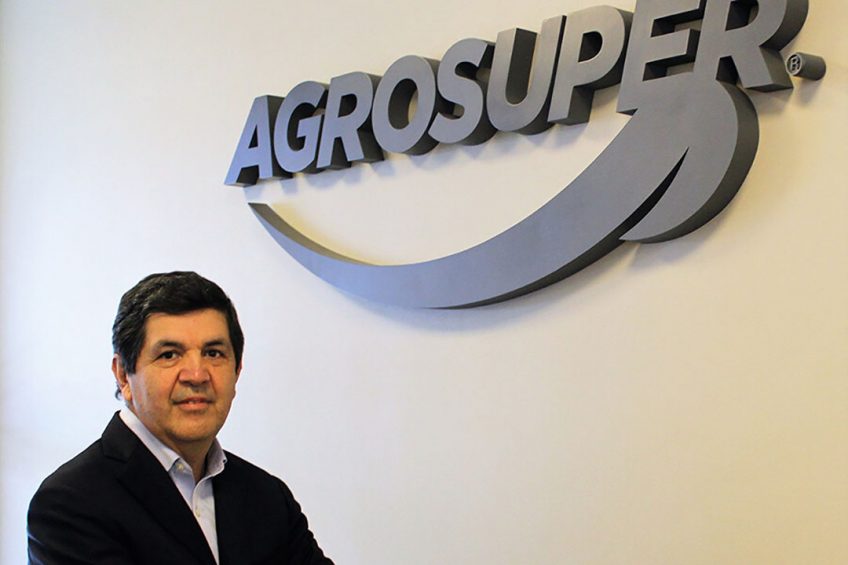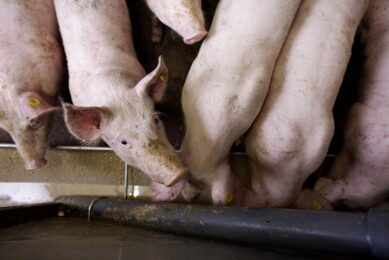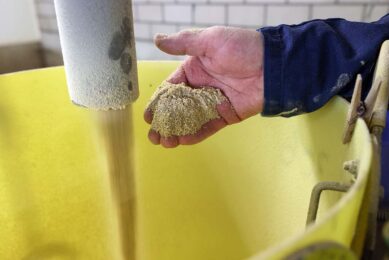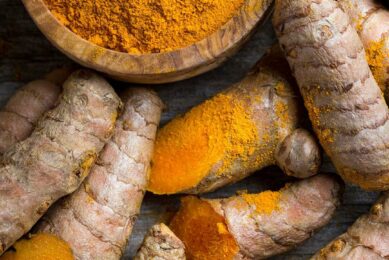Interview: Replacing fishmeal is not an easy challenge

No doubt, one of South America’s largest swine producers is Agrosuper, based in Chile. The company recently embarked on a journey to replace as much fishmeal as they can from their post-weaning diets. Dr Wolfgang Peralta, head of swine feeding and nutrition, explains why and describes the solutions they found.
Every year, when the global pork mega producers are announced, the southernmost spot on the map is taken by Agrosuper, in Chile. Since the integrator company embarked on swine production in 1983, it has grown to include 135,000 sows, slaughtering 3,750,000 pigs per year. To feed all these pigs, in 2019 alone Agrosuper’s own feed mills produced 1,236,000 metric tonnes of pig feed – an amount that will only rise in the years to come.
With these dazzling numbers, one little adjustment in feed rations can make a huge impact. Dr Wolfgang Peralta has been working for 35 years with Agrosuper and, apart from overseeing the development of the pig genetic programme, he is responsible for feeding and nutrition within the company’s swine business. He says, “It is very important for us to use pig space in a more efficient manner today, because with the same buildings we can produce more kilogrammes of pork meat per year.”
In a nutshell – how have these 35 years at Agrosuper been for you?
“I was raised in the countryside in Chile and I studied veterinary science at the University of Chile. After I finished my degree, I began working at Agrosuper in 1985 as a veterinarian. I worked on health issues between 1985 and 1988, and then I was promoted and put in charge of a third of the sows.
“In the meantime, the company had decided to move from natural mating to artificial insemination (AI) and gave me the responsibility of introducing AI in our company. For that, I received training in Brazil and Spain. I started in 1987 and I needed to move the whole company from natural mating to AI in ten years. It was not easy, because most of the people were working in natural mating, but we successfully finished in 1997.
“In 1992 Agrosuper made me responsible for developing R&D in the company, and I worked in that area from 1992 until 2018, two years ago. Now I am responsible for nutrition and swine genetics. I am also still involved in all of the issues in reproduction and in the post-weaning area, because I need to advise those people.”
How has Agrosuper changed in these 30 years in your view?
“Since I started, pig production has become a specialised science, because we export and are dealing with a lot of requirements. The production process has been significantly improved from the nutritional, genetic, managerial and sanitary control points of view. For us it is very important to guarantee food safety, which is why we maintain strict biosecurity measures and we raise animals with a high health status.”
We try to reduce total crude protein levels in our diets through commercial amino acids that are available on the market
How important are concepts such as sustainability and welfare for Agrosuper?
“For us they are big concerns, and they form the pillars of our production, because today this is demanded by the market. We are testing the effect of classical music on pregnant sows, we are supplying toys to the animals, we are investing in automatic climate control, we developed heat pads for piglets, we incorporate three-deck trucks during transport, we have an elevator to lift the pigs so that we reduce injury to the animals, and we maintain the ventilation inside to ensure the well-being of those animals.
“We have also developed a digital biosecurity system which requires every person who enters our farms to be previously registered and authorised and to have successfully completed E-learning that gives a minimal knowledge of biosecurity. In addition, the process must be completed with a national identity document, verifying that the person who enters the farms complies with the biosecurity regulations for their entry.”
How important is antibiotic reduction in your view and how can we see that in Agrosuper’s method of production?
“Agrosuper will only use antibiotics for specific medical situations, under the strict control and recommendation of a veterinarian. The aim is to preserve the health and well-being of the animals, to deliver a safe product of the highest quality for all clients and consumers. Also all procedures are documented, to ensure that our workers maintain good practices. We are implementing an official programme called ‘Prudent use of antimicrobials’, through which we will gradually reduce the use of antibiotics using strict controls made by our multidisciplinary pig production team.”
How many tonnes of pig feed were consumed on Agrosuper farms in 2019?
“In 2019 the feed produced just for pig production was 1,236,000 metric tonnes. We are an integrated company, which means that we produce feed only for our own farms. For 2021 we project production to be 1,310,000 metric tonnes.”
We follow the ideal protein concept; in that way we will have more efficient production and will reduce nitrogen excretion to the environment
In terms of nutrition, which issues drive diet formulation on swine farms nowadays?
“One issue is that we try to reduce total crude protein levels in our diets through commercial amino acids that are available on the market. We follow the ideal protein concept; in that way we will have more efficient production and will reduce nitrogen excretion to the environment. In order to be more efficient, we have standardised the feeders. When using wet-dry feeders, we need to maintain a good balance between feed and water supply so the animals don’t have the opportunity to lose feed. This is a very important and practical issue, because we need to create a simple system to regulate the feed supply and water supply in this type of feeder.
“Recently we have also been focused on reducing the use of fishmeal in our post-weaning diets. Today we use it only in the first four post-weaning diets, in very low inclusion percentages. In the near future we do not want to use fishmeal at all in our diets, because it is expensive and availability is sometimes low. Nowadays there is high demand from salmon production, for example. And China too – when they start to buy fish meal, sometimes it has low availability in the market.”
In that context, Agrosuper recently decided to include plant-based protein concentrates in piglet diets in all its farms. You opted for Joosten Young Animal Nutrition in the Netherlands; rations are being added to weaner diets for animals up to 25 kilogrammes. Why did you choose a company from a different continent?
“We always evaluate different products from different countries and different suppliers. We tested it in our research farm and our rearing farms, with our post-weaning piglets, and we detected very good performance in our piglets. We also saw that the animals had very good intestinal stability. That means we don’t see too much diarrhoea or scours.
“For us it was always a challenge to reduce the fishmeal inclusion, because our goal was to maintain the performance of the piglets. But we did reduce the fishmeal inclusion with Joosten products. In post-weaning animals this issue is very important, because if you maintain the integrity of the intestine in the first period, the animals will grow safely and to their maximum potential. If you create intestinal problems with your post-weaning diets, the pigs will never reach their maximum growth potential in their productive life.
“By adding it to all four post-weaning diets, at a rate of on average 8% for instance, we managed to replace 50% of the fishmeal.”
Will the world be able to feed 9.2 billion people in 2050?
“We are positive thinkers. Over the years we see that human beings have found more efficient ways to deal with the different resources of this world. I believe that we will adapt and find different solutions to achieve this goal.”
Last but not least, you have been working with Agrosuper for over 30 years. What makes the company attractive to work for?
“In Agrosuper we know that people are important and that’s why we develop new ideas and support and develop innovation in all our areas of production. That way we can develop people as professionals and as people. That was very important for me to achieve in this company.”
Pig production at Agrosuper
Agrosuper is Chile’s largest agricultural integrator, based in the Valparaíso, Metropolitan and O’Higgins regions in Chile. The company started out in 1955 with the production of eggs and gradually developed into other areas as well, including broilers, pigs, turkeys and aquaculture. The company also has its own feed production, breeding centres, distribution centres and business offices.
They maintain a distribution chain that covers all of Chile from Arica to Punta Arenas. They also have seven international offices in the US, Mexico, Italy, China and Japan, which enables the company to be closer to those customers and consumers, thereby providing a more timely response and due diligence to local requirements.
From 1983, the company started growing pigs and selling pork under the brand “Super Cerdo”, and it currently has 135,000 commercial sows with high genetic value in production, achieving an average of 30.6 pigs/sow/year. The company has two slaughter and processing plants (Rosario and Lo Miranda in the O’Higgins region); together they slaughter 3,750,000 pigs/year. Normally the ideal market weight for Agrosuper pigs is 126kg, at 168 days old. The company has achieved a feed efficiency of 2.478, using medium-energy diets. Agrosuper produces 3,490kg of pork meat per sow per year.











